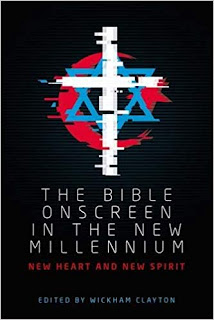Bad Lieutenant
 Warning. Spoilers Throughout!
Warning. Spoilers Throughout!In preparation for seeing Abel Ferrara's Mary, I thought I would watch some of his earlier films to get a feel for what he does. The obvious starting place was Bad Lieutenant, and I finally tracked down a reasonably priced copy, and sat down to watch it the other night. In case you are wondering why it was an obvious starting point, let me outline my prior knowledge of the film. I knew it was about a bad cop played by Harvey Kietel, and as a result it was not for the faint-hearted, and I knew there was a "cameo" by Jesus in it. I also knew it had been on the 2004 version of the Arts and Faith Top 100 - a list that I personally care for more than the 2005 version. Looking Closer's Jeffrey Overstreet wrote the following capsule review:
Bad Lieutenant is a very serious film with an extremely powerful conclusion. The film is noteworthy because it is a well-known director wrestling with hard spiritual questions in a way that ultimately leads its character to Christ's feet. But it is so explicit and harsh, I wouldn't recommend it casually to anybody but the most devoted film student who is interested in the ways that Christian faith has been dealt with in film.
Knowing what I did about the film meant that I pretty much knew that this would be a tale of redemption (FWIW my favourite theme), of the light shining in the darkness, and I wasn't much wrong. I think that knowing this, meant that when the pivotal scene - where The Lieutenant at the end of this tether has a vision of Jesus and crawls towards him on his hands and knees - didn't really move me as much as I'd hoped. What I did find powerful was the final "shot" of the film whereby the consequences of the Lieutenant's sins catch up with him. Too often redemption films equate to "get out of jail free" cards. I don't mind that per se, but it's nice to see a film that draws a line between forgiveness from God, and release form the consequences of your sins. Another film that does this well is Dead Man Walking. The crucial difference between that and this is the unexpectedness of it.
One of the other things I liked about it was how Harvey Kietel's redemption doesn't automatically equate to his instant and complete transformation. He still can't resist the drugs of the criminals he is about to liberate, and hee still verbally abuses them even as he gerapples with this thing called forgiveness he has just discovered. It's interesting how these closing scenes mirror Jesus' understanding of forgiveness as outlined in the Sermon on the Mount. "For if you forgive men when they sin against you, your heavenly Father will also forgive you. But if you do not forgive men their sins, your Father will not forgive your sins" (Matt 6:14-15). Our receiving forgiveness is dependant on us being prepared to forgive.
 In terms of the portrayal of Jesus in this film - it is primarily as a vessel for forgiveness, although the earlier shots of a crucified Jesus screaming as a nun is horrifically raped also portray him as someone who identifies with us in our times of suffering. I think the nun is also shown as a representation of Christ in the film. Certianly the way that the footage of her suffering is intercut with Jesus' passion (suffering) indicate there is meant to be some connection between the two. As the film unfolds, it is her determination to forgive and to "pray for those who persecute you" (Matt 5:44) that turns the Lieutenant's world on it's head, and gets under his skin. Ultimately, her acts cause him to be saved.
In terms of the portrayal of Jesus in this film - it is primarily as a vessel for forgiveness, although the earlier shots of a crucified Jesus screaming as a nun is horrifically raped also portray him as someone who identifies with us in our times of suffering. I think the nun is also shown as a representation of Christ in the film. Certianly the way that the footage of her suffering is intercut with Jesus' passion (suffering) indicate there is meant to be some connection between the two. As the film unfolds, it is her determination to forgive and to "pray for those who persecute you" (Matt 5:44) that turns the Lieutenant's world on it's head, and gets under his skin. Ultimately, her acts cause him to be saved.It's difficult to know what to make of Ferrara though. The man started in the porn industry, but his recent films seem obsessed by Jesus, or at least with Catholicism. His films are dark, and marks the depths of depravity humanity sinks to, but he shows a light to shine in the darkness. Most films are on some level auto-biographical, but I wonder if this one is particularly so with Ferrara. Alternatively, is he just mocking the idea of forgiveness, such that the Lieutenant's untimely death acts simply to quash the very idea that forgiveness is permissable.
Finally, although this is the first film I have seen by Ferrara, I can't help noticing certain similarities with Martin Scorsese. Obviously, both directors love New York, and Harvey Kietel. And both directors like exploring the underworld, and their Catholic roots. Perhaps it was simply those factors that drew me to make a comparison, and perhaps his other films are less reminiscient of Scorsese's Mean Streets. That said Ferrara's Mary could be his equivalent of The Last Temptation of Christ. I'll be interested to see.
Matt
Labels: Jesus Cameos, Mary (Abel Ferrara), Mary Magdalene













0 Comments:
Post a Comment
<< Home